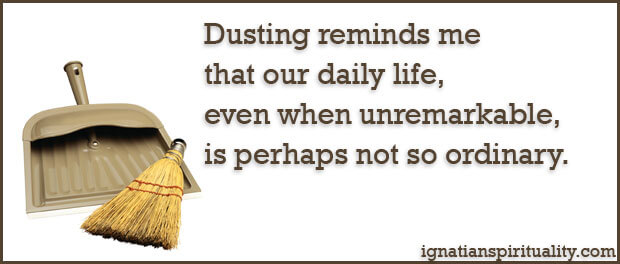
Last week, I pushed my office door open and flicked on the lights, to find it looking wan and grey under a six-month shroud of dust. In the middle of last May, I packed up my plants and left a note on the board outside my door: “On sabbatical. Back in January 2016.”
It’s been an incredible and productive time. The first draft of a book is done. I had the privilege of visiting the Vatican Observatory to talk to the astrophysicists, with a chance not only to walk in the papal gardens, but to see the meteorite lab there. I hiked the west coast of Ireland with my husband. But today I am back, facing the ordinary after this six-month stretch of extraordinary days.
In between meetings I dust, methodically clearing desk and table, running a cloth over the lamps. Perhaps if I polish up the ordinary until it glows, I’ll feel ready to return to my routine, with its round of lectures and office hours and mounds of papers to grade. Or perhaps not. As the dust flies, my mind drifts back to a walk along the Irish cliffs, the waves pounding so hard against the rocks the water is ground into a mist, the salty crystals of which I’d wipe from my glasses hours later.
It’s a short and drier walk to my bookcase where I pull a volume of Marilyn Nelson’s poetry off the shelf, blow the dust off my glasses, and page through until I find what I’m looking for: “Dusting.”
Thank you for these tiny
particles of ocean salt,
pearl-necklace viruses
winged protozoans:
for the infinite
intricate shapes
of submicroscopic
living things.
Nelson’s poem—and my dusty office—reminds me that the unpolished and ordinary is cloaked in the extraordinary. Even as I settle back into my everyday life, in that dust, tiny tokens of the universe have settled into my office. Should I be able to sort through the motes, I expect I would find fragments brushed from the cliffs in Ireland, blown into the air by storms in the Pacific, and burnt off comets that blundered into Earth’s atmosphere. Crumbs of the infinite lie scattered across my desk. I’m suddenly hesitant to pick up my dust rag and wipe it all away.
In his book, Encounters in Silence, Karl Rahner, SJ, reflects, “if there is any path at all on which I can approach You, it must lead through the middle of my very ordinary daily life.” Dusting reminds me that our daily life, even when unremarkable, is perhaps not so ordinary. As I step back into my teaching, into the very ordinary days of my life, I’m reminded to think twice about brushing off the infinite hiding within the immanent. Fragments of God are strewn wherever I walk.
Hear Krista Tippett and Marilyn Nelson discuss this post on On Being.

Loved hearing this blog post referenced on the radio show “On Being” with Krista Tippet interviewing Marilyn Nelson. Beautiful! http://onbeing.org/programs/marilyn-nelson-communal-pondering-in-a-noisy-world/
Your article is beautiful and grace filled. It gave me a whole different perspective on the oft dreaded task of dusting. Now I won’t mind contemplating on that dust for a while, then sending it off for someone else to enjoy. From stardust to stardust, we are all in One.
What a fantastic post.
I love:
Should I be able to sort through the motes, I expect I would find fragments brushed from the cliffs in Ireland, blown into the air by storms in the Pacific, and burnt off comets that blundered into Earth’s atmosphere. Crumbs of the infinite lie scattered across my desk.
and:
I’m reminded to think twice about brushing off the infinite hiding within the immanent. Fragments of God are strewn wherever I walk.
You write beautifully.
Your post reminded me of the remarks that I made at my daughter’s wedding 11 years ago. I announced that I was going to talk about dust. That got people’s attention. I talked about not letting the things that received that day to get dusty – not to let the relationships with all the people there get dusty – not to let their own relationship with each other to gather dust. It’s not what you were talking about, but it brought me back to that day and those remarks. I’m happy to say that they have been great about nurturing all those relationships and use the beautiful things they were given on the occasion of their marriage – the tangible, usable objects of the everyday and the grace-filled gifts they also presented.
I am reminded of my high school science teachers who would leave me thinking all day long as they told me I was probably breathing in molecules that daVinci or Michaelangelo had also breathed. Amazing article. It is in the seemingly unspectacular and ordinary flow of everyday life that we learn who we really are, and that is where others learn who we are as well. “Seemingly” ordinary as Michelle points out. I promise to now pay better attention to fragments of God I am lucky to walk through all day long. Thanks.